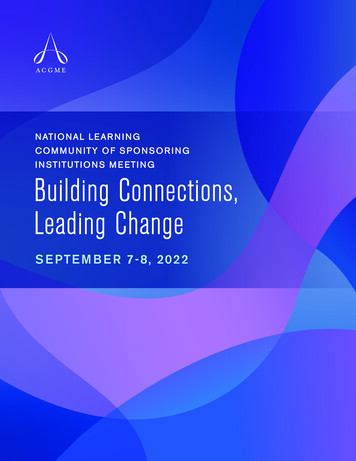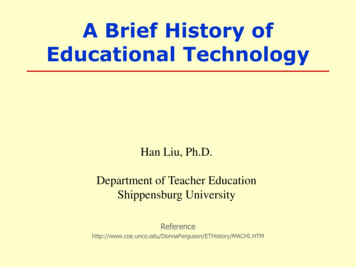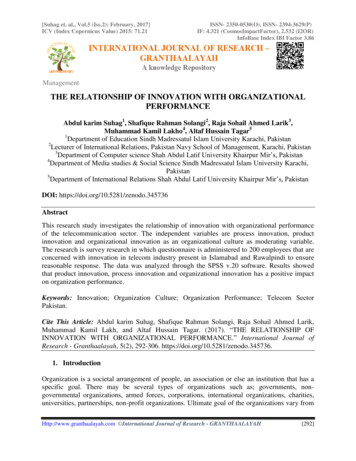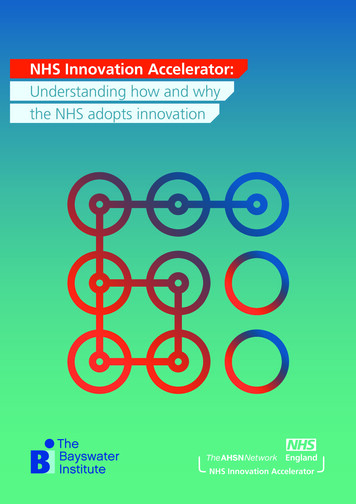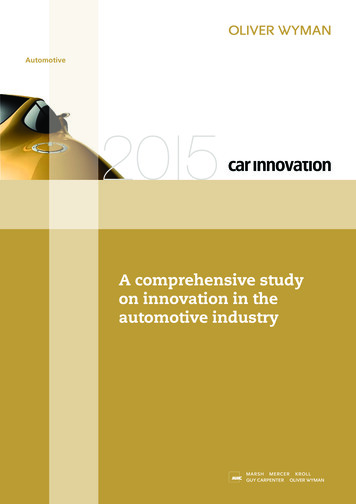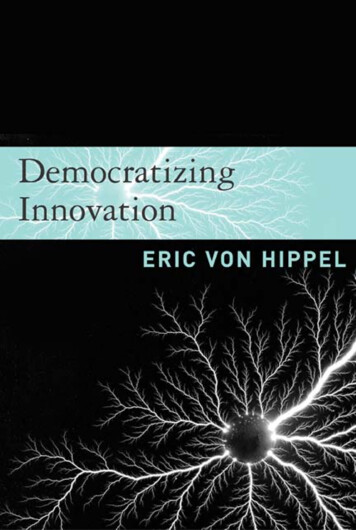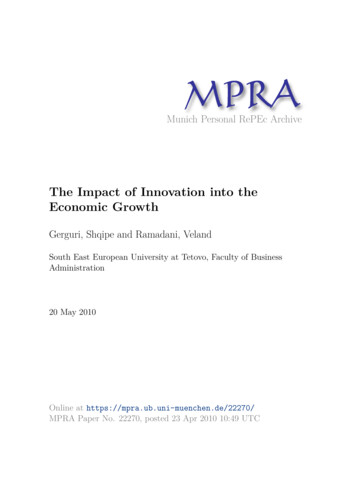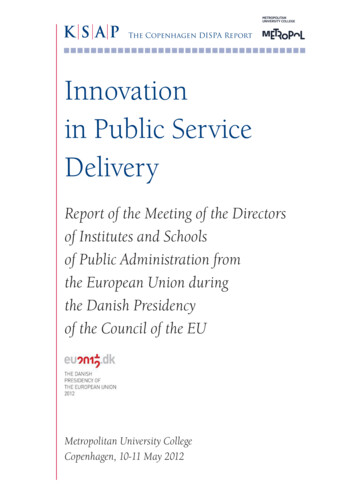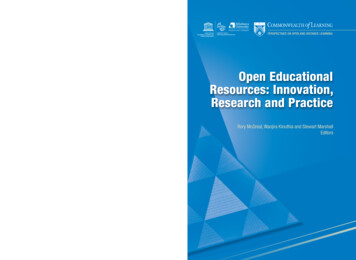
Transcription
C O LC O LOPEN EDUCATIONAL RESOURCES: INNOVATION, RESEARCHAND PRACTICEPERSPECTIVES ON OPENAND DISTANCE LEARNINGPERSPECTIVES ON OPEN AND DISTANCE LEARNINGPERSPECTIVES ON OPEN AND DISTANCE LEARNING“Everyone has the right to education.”“Educators worldwide are developing a vast pool of educational resources on theInternet, open and free for all to use. These educators are creating a world whereeach and every person on earth can access and contribute to the sum of all humanknowledge. They are also planting the seeds of a new pedagogy where educatorsand learners create, shape and evolve knowledge together, deepening their skillsand understanding as they go.”Cape Town Declaration, 2007Open Educational Resources (OER) — that is, teaching, learning and research materialsthat their owners make free to others to use, revise and share — offer a powerful meansof expanding the reach and effectiveness of worldwide education. Those resources can befull courses, course materials, modules, textbooks, streaming videos, software, and othermaterials and techniques used to promote and support universal access to knowledge.This book, initiated by the UNESCO/COL Chair in OER, is one in a series of publications bythe Commonwealth of Learning (COL) examining OER. It describes the movement in detail,providing readers with insight into OER’s significant benefits, its theory and practice, and itsachievements and challenges. The 16 chapters, written by some of the leading internationalexperts on the subject, are organised into four parts by theme:1. OER in Academia – describes how OER are widening the international community ofscholars, following MIT’s lead in sharing its resources and looking to the model set bythe OpenCourseWare Consortium2. OER in Practice – presents case studies and descriptions of OER initiatives underwayon three continents3. Diffusion of OER – discusses various approaches to releasing and “opening” content,from building communities of users that support lifelong learning to harnessing newmobile technologies that enhance OER access on the Internet4. Producing, Sharing and Using OER – examines the pedagogical, organisational,personal and technical issues that producing organisations and institutions need toaddress in designing, sharing and using OERInstructional designers, curriculum developers, educational technologists, teachers,researchers, students, others involved in creating, studying or using OER: all will find thistimely resource informative and inspiring.PRINTED IN CANADAPrinted according to environmentally progressive print practices, using chlorine-free,recycled fibres. Electricity used in manufacturing the paper stock has been offset byGreen-e renewable energy certificates.Open Educational Resources: Innovation, Research and PracticeUNESCO Paris Declaration on OER, 2012Open EducationalResources: Innovation,Research and PracticeRory McGreal, Wanjira Kinuthia and Stewart MarshallEditors
PERSPECTIVES ON OPEN AND DISTANCE LEARNINGOpen EducationalResources: Innovation,Research and PracticeRory McGreal, Wanjira Kinuthia and Stewart MarshallEditorsTim McNamaraManaging EditorPublished by Commonwealth of Learning and Athabasca University, Vancouver, 2013
The Commonwealth of Learning (COL) is an intergovernmental organisationcreated by Commonwealth Heads of Government to encourage the developmentand sharing of open learning and distance education knowledge, resources andtechnologies.Commonwealth of Learning and Athabasca University, 2013 2013 by the Commonwealth of Learning and Athabasca University.PERSPECTIVES ON OPEN AND DISTANCE LEARNING: Open EducationalResources: Innovation, Research and Practice is made available under a CreativeCommons Attribution-ShareAlike 3.0 Licence s/by-sa/3.0.For the avoidance of doubt, by applying this licence the Commonwealth ofLearning and Athabasca University do not waive any privileges or immunities fromclaims that they may be entitled to assert, nor do the Commonwealth of Learningand Athabasca University submit themselves to the jurisdiction, courts, legalprocesses or laws of any jurisdiction.PERSPECTIVES ON OPEN AND DISTANCE LEARNING: Open EducationalResources: Innovation, Research and PracticeRory McGreal, Wanjira Kinuthia and Stewart Marshall, EditorsTim McNamara, Managing EditorISBN 978-1-894975-62-9Published by:COMMONWEALTH OF LEARNINGUNESCO/COL CHAIR IN OER1055 West Hastings, Suite 1200Vancouver, British ColumbiaCanada V6E 2E9Telephone: 1 604 775 8200Fax: 1 604 775 8210Web: www.col.orgE-mail: info@col.orgTechnology Enhanced KnowledgeResearch InstituteAthabasca UniversityPeace Hills Trust Tower1200, 10011 – 109 StreetEdmonton, AlbertaCanada T5J 3S8Telephone: 1 855 807-0756(toll free in Canada & USA) 1 780 235-0901(international)Web: tekri.athabascau.caE-mail: rory@athabascau.caWith support from:
ContentsForeword.vContributors. viiAcknowledgements. xiiiIntroduction: The Need for Open Educational Resources.xvRory McGreal, Athabasca UniversityPART I: OER in AcademiaIntroduction. 3Chapter 1Massive Open Online Courses: Innovation in Education?. 5George Siemens, Athabasca UniversityChapter 2Academic Knowledge Mobilisation to PromoteCultural Change Towards Openness in Education. 17José Vladimir Burgos Aguilar and Maria Soledad Ramírez Montoya,Tecnológico de MonterreyChapter 3365 Days of Openness: The Emergence of OERat the University of Cape Town. 33Cheryl Hodgkinson-Williams, Michael Paskevicius, Glenda Cox,Shihaam Shaikh, Laura Czerniewicz and Samantha Lee-Pan,University of Cape TownChapter 4Open Educational Resources University:An Assessment and Credit for Students Initiative. 47Rory McGreal, Athabasca UniversityWayne Mackintosh, OER FoundationJim Taylor, University of Southern QueenslandPART II: OER in PracticeIntroduction. 63Chapter 5Open Education Research: From the Practical to the Theoretical. 65Patrick McAndrew and Robert Farrow, Open University UKChapter 6Realising the Open in Open Educational Resources:Practical Concerns and Solutions. 79Norm Friesen, Thompson Rivers UniversityChapter 7Approaches to the Production and Use of OERs:The African Virtual University Experience. 91Bakary Diallo, Catherine Wangeci Thuo (Kariuki) andClayton R. Wright, African Virtual Universityiii
Chapter 8Sharing of Open Science Education Resources andEducational Practices in Europe. 105Demetrios G. Sampson and Panagiotis Zervas,University of PiraeusSofoklis Sotiriou, Ellinogermaniki AgogiPART III: Diffusing OERIntroduction. 125Chapter 9Open Educational Resources: Access to Knowledge —A Personal Reflection. 127Susan D’Antoni, Athabasca UniversityChapter 10How OER Support Lifelong Learning. 141Andy Lane, Open University UKChapter 11An Open “Materials” Repository and Global Search System:Preparing for Diverse Learners and a Variety of Learning Processes. 153Tsuneo Yamada, Open University of JapanChapter 12Wikiwijs: Using OER as a Driver for Maturation. 165Robert Schuwer, Open Universiteit in the NetherlandsPart IV: Producing, Sharing and Using OERIntroduction. 175Chapter 13Why Teachers Share Educational Resources:A Social Exchange Perspective. 177Frederik Van Acker, Hans van Buuren, Karel Kreijns andMarjan Vermeulen, Open Universiteit in the NetherlandsChapter 14Can Open Educational Resources Thrive in Closed EducationalSystems? Some Reflections on OER in Developing Countries. 193Abdurrahman Umar, Balasubramanian Kodhandaraman andAsha Kanwar, Commonwealth of LearningChapter 15The Role of Open Educational Resources in Personal Learning. 207Stephen Downes, National Research Council of CanadaChapter 16Towards a Sustainable Inter-Institutional CollaborativeFramework for Open Educational Resources (OER). 223Dick Ng’ambi, University of Cape TownAirong Luo, University of Michiganiv
ForewordSince the UNESCO Paris Declaration on OER adopted by the global communityin June 2012, there have been a number of developments, and the key question isno longer about the “how” of OER development. We are no longer talking aboutauthoring tools or distribution systems. It is more about realising the value tobe derived from OER. This involves defining an OER value chain that will helpstakeholders identify the various sub-systems in the chain that link the individualteacher’s or learner’s contribution relating to OER use, to bigger initiatives suchas good-quality open textbooks or Massive Open Online Courses (MOOCs)which could lead to viable academic qualifications and credentials involvinginstitutions.The development and exchange of OER continues to be a technologicallyintensive process. Technological considerations in OER are not limited toauthoring or remixing tools. Collaborative production of OER requires welldesigned and robust online spaces and infrastructure (Wikiwijs) and repositories.The latter can also be used to combine OER to create lesson plans online (OpenScience Education Resources in Europe). Unless OER are consistently andadequately described, they cannot easily be located in online searches. Thechapter on GLOBE considers these challenges and offers solutions. COL’s earlierpublications on OER offered insights and advice on good institutional practices,business models and policy matters.However, the social dimension emerges as an important factor from a numberof chapters in this book. The study on OpenLearn shows that when OER aretaken directly from formal courses, the biggest impact is on the formation ofcommunities of learners around the OER. This is similar to the conclusion ofthe chapter on OER for Lifelong Learning, both reflecting the experience of theUK’s Open University. The African Virtual University (AVU) chapter revealsthe importance of the formation of a consortium of OER producers acrossinstitutions and countries. This process requires subtle yet intensive facilitationfor its sustenance and is important for the quality assurance of OER. The detailedanalysis of the experience of the African Health OER Network also points to theviability of viewing OER as a social practice.In two different chapters that focus on MOOCs (contributed by the globalpioneers of MOOCs), what emerges is that even if the teachers do not use OER,the learners draw upon OER through their own social space and networks. Thechapter based on COL’s experience reveals that the existing hierarchies andpower relationships in many developing country institutions do not allow forthe decentralisation that fosters and encourages the use of OER. The experienceof the Open University in the Netherlands reveals the significant role of trust inencouraging the increased use and sharing of OER.v
The chapter on OERu identifies more fully all the linkages and sub-systems inthe OER value chain. It also shows the importance of how trust-based interactionsamong institutions can advance the value of OER for a wide range of stakeholders.Thus, it is not just lack of policy that can hold back OER development and re-use, butan inadequate appreciation of the social aspects as well. Chapters on OER in academia(Mexico and South Africa) show the importance of blending bottom-up processesof OER generation and exchange among faculty with top-down policy support. It issignificant that this book combines the technology aspects with social values andthe impact that these have on the users and creators of OER.Licensing considerations are inseparable from discussions of OER and are takenup in a separate chapter. This book of research articles about OER is itself anOER, as are the individual chapters, all available under a Creative Commons 3.0attribution Share-Alike licence. Published by COL, the book is produced as partof the work plan of the UNESCO/COL Chair, which was granted to AthabascaUniversity and is led by Professor Rory McGreal, one of the editors. The othereditors, Dr. Wanjira Kinuthia and Emeritus Professor Stewart Marshall, are part ofthe international group of UNESCO/COL Chair partners.Contributions in this volume provide insights, experience-based case studiesand analyses which will help readers grasp the essential contours of the OERvalue chain. COL’s OER publications in the last two years provide the mostcomprehensive view of the various sub-systems and linkages in the non-U.S.milieu, and this book is yet another contribution in that direction.The individual book chapters are included in the OER Knowledge Cloud(oerknowledgecloud.org), which is a Web repository of more than 400 researchpapers and reports on OER. This Knowledge Cloud provides researchers with freeand easy access to the OER research knowledge base, including refereed papers,presentations, dissertations, reports and other OER-related publications. Thecloud has been created at Athabasca University as part of the international Chairwork plan. The rationale for this is the growing need for a substantial expansionof the OER research base that can provide researchers with the means to explorenew knowledge about OER. It is hoped that this book, along with the OERKnowledge Cloud, can provide a solid foundation supporting the introductionand implementation of OER innovations, increasing the research evidence andproviding guidance for OER in practice.Given COL’s commitment to implementing the recommendations of theParis OER Declaration, COL will continue its advocacy efforts, encourage thedevelopment of policy, support capacity building and promote OER research.Some of the key global leaders in the OER movement have shared their valuableexperiences and insights along all these dimensions in this book, which I mostheartily commend to you.Professor Asha KanwarPresident & Chief Executive OfficerCommonwealth of Learningvi
ContributorsJosé Vladimir Burgos Aguilar is Open Content Coordinator and Liaison Officerof Innovation and Educational Technology at the Innov@TE Center, Centerfor Innovation in Technology and Education at the Virtual University of theTecnológico de Monterrey. He is also project manager of OCW Tecnológico deMonterrey and temoa.info (Knowledge Hub/OER search engine).Glenda Cox is a lecturer at the Centre for Educational Technology, Universityof Cape Town. She focuses on curriculum projects, teaching with technology,innovation grants, OER (Open Educational Resources) and staff development.Laura Czerniewicz is Director of the Centre for Educational Technology at theUniversity of Cape Town. She is the research leader on a project on students’technological habitus use in higher education institutions in South Africa. She isalso researching: the emergent knowledge domain of the field; mobile learning;the digital divide and ICTs; and scholarly communication.Susan D’Antoni is Advisor to the President for International OER (OpenEducational Resources) Initiatives at Athabasca University and is associated withthe UNESCO/COL Chair in OER. The focus of her current work is a collaborativeglobal mapping of institutional OER initiatives to promote communication,connection and collaboration in the global OER movement. Susan worked asa consultant at the International Association of Universities, and then at theUNESCO International Institute for Educational Planning (IIEP) and EducationDivision as Programme Specialist. She has been a leader in the OER movementsince the term was first coined.Bakary Diallo is the CEO/Rector of the African Virtual University (AVU), anintergovernmental organisation based in Nairobi, Kenya, which specialises inopen distance and electronic learning. Prior to joining the AVU, he worked atthe University of Ottawa as a part-time lecturer at the Faculty of Education, andas a consultant of integration of ICT in education at the Center for UniversityTeaching. He also taught at the secondary level in Senegal. His latest researchactivities focus on the use of ICT in higher educational institutions.Stephen Downes is a researcher at the National Research Council of Canada. Heis a designer and commentator in the fields of online learning and new media.Stephen has explored and promoted the educational use of computer and onlinetechnologies since 1995 and was one of the originators of the first Massive OpenOnline Course. He is known for his blog, “Stephen’s Web,” which is followed bymany eLearning specialists.vii
Robert Farrow is a research associate at the Institute of Educational Technology of theOpen University UK. He has developed expertise in accessibility, evaluation, mobilelearning, use of technology to support research communities, and open learning.Norm Friesen is Canada Research Chair in E-Learning Practices at ThompsonRivers University in Kamloops, British Columbia, Canada. He has been leading theCanCore Learning object metadata initiative. He is also a member of the Canadiandelegation to the ISO/IEC JTC1 subcommittee 36, for Learning, Education andTraining. His research interests include media theory, alternative pedagogies,technical eLearning standardisation, phenomenology and ethnomethodology.Cheryl Hodgkinson-Williams is an Associate Professor of informationcommunication technologies (ICT) in education at the University of Cape Town(UCT). She is the co-ordinator of the Mellon Scholarship programme, whichsponsors colleagues from higher education institutions in Africa to attend apostgraduate programme in ICT in Education at UCT. Cheryl is also a lecturer onthe MEd ICT in Education programme.Asha Kanwar is the President and CEO of the Commonwealth of Learning.She was the Vice-President and Programme Director before that. Previously, shewas a consultant in open and distance learning at UNESCO’s Regional Office forEducation in Africa (BREDA) in Dakar, Senegal. Her engagement with distanceeducation began when she joined Indira Gandhi National Open University(IGNOU), where she served as Professor, Director of the School of Humanities andPro-Vice Chancellor.Wanjira Kinuthia, PhD, is Associate Professor of Learning Technologies atGeorgia State University. Prior to that, she worked as an instructional designer inhigher education and business and industry for several years. Wanjira has a specialinterest in international and comparative education. Her research focuses oneducational technology in developing countries, including the role of OER (OpenEducational Resources) and sociocultural perspectives of instructional design andtechnology. She is co-editor of the book series Educational Design and Technology inthe Knowledge Society.Balasubramanian Kodhandaraman is an education specialist at theCommonwealth of Learning (COL), working in the area of agriculture andlivelihood. He is focusing on the Lifelong Learning for Farmers initiative in variousCommonwealth countries, with emphasis on non-formal and informal learning.Karel Kreijns is at the Technical University Eindhoven. He has worked at the OpenUniversiteit in the Netherlands, where he collaborated with colleagues in theEducational Technology field.Andy Lane is a Professor of Environmental Systems at the Open University UK,and was formerly director of the OpenLearn initiative for free and OER (OpenEducational Resources) for learners and educators. He is a former dean anddirector of studies of the Faculty of Technology. He is interested in how peopleunderstand and use technologies for environmental resource management andopen education and, particularly, in how systems thinking can be used to improveenvironmental decision-making and social learning.viii
Samantha Lee-Pan is a graduate student at the University of Cape Town andan OER (Open Educational Resources) project administrator in the EducationalDevelopment Unit of the Faculty of Health Sciences.Airong Luo is a researcher at the Office of Learning Technologies at the Universityof Michigan Medical School. Her work focuses on OER (Open EducationalResources) and understanding how to build a sustainable model for OER.Wayne Mackintosh is a UNESCO/Commonwealth of Learning Chair in OER(Open Educational Resources) and the founding Director of the OER Foundationand the International Centre for Open Education based at Otago Polytechnic,New Zealand. He also serves as a member of the Board of Directors of the OERFoundation and is a leader in the formation of the OERu (OER university)initiative. He was previously Education Specialist for eLearning and ICT Policy atthe Commonwealth of Learning.Stewart Marshall, PhD, is an Emeritus Professor at the University of the West IndiesOpen Campus and also Founding and Managing Editor of the International Journalof Education and Development Using Information and Communication Technology(IJEDICT) (http://ijedict.dec.uwi.edu/). Previously, he was Director of SpecialInitiatives in the Office of the Principal of the University of the West Indies OpenCampus and UNESCO Chair in Educational Technologies. Professor Marshall hasworked in higher education since 1973. He has held senior management positions inuniversities in the UK, Papua New Guinea, Australia, Swaziland and the Caribbean.He has over 100 publications, including book chapters, refereed articles andconference papers, an encyclopedia and several books.Patrick McAndrew is a professor of Open Education at the Institute ofEducational Technology of the Open University UK. He directed the research andevaluation within OpenLearn and he is the Programme Lead for the Learning inan Open World research area. Previously, he worked at Heriot-Watt Universitywhere he was Manager of the Institute for Computer Based Learning within theLearning Technology Centre.Rory McGreal is a UNESCO/Commonwealth of Learning Chair in OER (OpenEducational Resources) and Director of the Technology Enhanced KnowledgeResearch Institute (TEKRI) at Athabasca University (AU), Canada’s open university,based in Alberta, Canada. He is also a professor of Computer Technologies inEducation He was previously the Associate Vice-President Research at AU. Priorto that, he was a supervisor at Contact North, a distance education network inNorthern Ontario. He has also worked abroad in the Middle East, Seychelles(Indian Ocean) and Europe. He has been honoured with the Wedemeyer Awardfor Distance Education practitioner. He researches the implementation andmanagement of distance education systems and networks from technological,pedagogical and policy perspectives. His present research interests includethe use of OER and standards in technology-assisted learning, particularly inthe development/application of learning objects on mobile devices and theassessment and accreditation of informal learners.Maria Soledad Ramírez Montoya is Director of the Research Chair in theGroup of Innovation in Technology and Education in Tecnológico de Monterreyix
(ITESM). She majored in Elementary Education, earning a BSc in Education in theTechnological Institute of Sonora in Mexico; and then graduating in EducationalTechnology with a PhD in Education and Educational Psychology: Curriculumand Instruction at the University of Salamanca (Spain), where she is currently aprofessor at the Graduate School of Education.Dick Ng’ambi is the Masters Programme Convenor in the Centre for EducationalTechnology at the University of Cape Town. Before that, Dick worked in highereducation as an educator in Zambia, Lesotho and South Africa. His researchinterests include anonymous knowledge sharing, use of mobile technology, andpodcasting.Michael Paskevicius is an educational technologist in the Centre for EducationalTechnology at the University of Cape Town. Originally from Canada, he arrivedin South Africa via Namibia after being awarded a Commonwealth of LearningInternational Internship in 2005.Demetrios G. Sampson is an Associate Professor of eLearning at the Departmentof Digital Systems, University of Piraeus, Greece; founder and Director of theAdvanced Digital Systems and Services for Education and Learning (ASK) ResearchLaboratory; and Senior Researcher at the Informatics and Telematics Institute (ITI)in the Center of Research and Technology Hellas (CERTH).Robert Schuwer is Associate Professor at the Open Universiteit in the Netherlandsand the project leader for the OpenER project, which was the first OER (OpenEducational Resources) project in that country. Currently, he is a project leaderin the Wikiwijs programme. He is chairman of the Special Interest Group OERfor Higher Education, established by SURF, and chairman of the NominatingCommittee of the OpenCourseWare Consortium.Shihaam Shaikh is a project manager for the Open UCT initiative at theUniversity of Cape Town. She is also the legal advisor for copyright and relatedintellectual property (IP) issues.George Siemens is an Assistant Professor at the Centre for Distance Education atAthabasca University. He is the organiser of one of the first Massive Open OnlineCourses (MOOCs) with Stephen Downes. He is the author of Knowing Knowledge,an exploration of how the context and characteristics of knowledge have changed,and of the Handbook of Emerging Technologies for Learning. Siemens is also theAssociate Director of the Technology Enhanced Knowledge Research Institute(TEKRI) at Athabasca University.Sofoklis Sotiriou has worked at CERN, at the National Center for ScientificResearch “Demokritos” in Athens, and in the Physics Laboratory of AthensUniversity. He holds a PhD in Astrophysics and a PhD in Technology EnhancedScience Education. He is the Head of the R&D Department of EllinogermanikiAgogi, where he has been active in the co-ordination and development of researchprojects on the implementation of advanced science education and training.Jim Taylor is a retired professor and former Deputy Vice-Chancellor (GlobalLearning Services) at the University of Southern Queensland. He is on the Boardx
of the OER Foundation, and is a leader in the development of the OERu (OERuniversity) initiative.Abdurrahman Umar is an Education Specialist, Teacher Education at theCommonwealth of Learning. Previously, he was the Director of Academic Servicesat the National Teachers’ Institute in Kaduna, Nigeria. He was in charge ofProgramme Design and Development and Examinations at the institute. He alsoserved as the Director of Programme Development and Extension at the NationalCommission for Nomadic Education in Kaduna.Frederik Van Acker is an Associate Professor at the Open Universiteit in theNetherlands, where he is Head of the Research Methods and Statistics departmentin the Psychology faculty.Hans van Buuren is an Associate Professor in the Psychology faculty of the OpenUniversiteit in the Netherlands. He is interested in educational statistics andresearch methods.Marjan Vermeulen is a part-time Associate Professor at RdMC, a centre for theprofessionalisation of teachers at the Open Universiteit in the Netherlands. She isalso a knowledge manager at the KPCgroep, an institute that offers advisory andresearch services to organisations in the field of education.Catherine Wangeci Thuo (Kariuki) is the Manager, Projects and Business Servicesat the African Virtual University, where she is an education specialist. Prior toher current position, she was the Project Manager of the AfDB/UNDP-fundedMultinational Education Project.Clayton R. Wright is an educational technology consultant best known forhis leadership in instructional design and for his list of educational technologyconferences. He was previously an instructor at Grant McEwan CommunityCollege in Edmonton, Alberta, Canada.Tsuneo Yamada is a Professor at the Department of International Collaborationin the Center for ICT and Distance Education (CODE) at the Open University ofJapan (OUJ); and an Adjunct Professor and the Chair of the Department of CyberSociety and Culture, the Graduate University for Advanced Studies. His mainresearch fields are educational technology, learning psychology, and secondlanguage learning. His current interests are in the development and evaluationof learning objects, strategies for their sharing and distribution, and their qualityassurance.Panagiotis Zervas received a Diploma in Electronics and ComputerEngineering from the Technical University of Crete, Greece, in 2002 andan MSc in Computational Science from the Department of Informatics andTelecommunications at the National and Kapodistrian University of Athens,Greece, in 2004.xi
AcknowledgementsThe editors would like to express their thanks to the following people who havemade this work possible: Susan D’Antoni, whose efforts have been crucial in th
the Commonwealth of Learning (COL) examining OER. It describes the movement in detail, providing readers with insight into OER's significant benefits, its theory and practice, and its . of the Open University in the Netherlands reveals the significant role of trust in
